Daily Atheist Devotional #190 (People You'll Meet in Hell Edition)
Oh, and let me answer for MultiPissMom so she doesn't have a ****** conniption fit:
OH DID close down the Rants and Raves board as moderated by OH cuz of all the infighting. I moved the party to a group moderated by ME. If it's all the catty bull**** infighting you're looking for, it doesn't exist any longer. If you're looking for comedy and provocative conversation topics, The New and Improved Rants and Raves forum is where it's at!!
 Thanks for the links!
Thanks for the links!I've posted those before. Here's the 50 most brilliant again -- I remember it cuz -- MICK JAGGER???
 Whaaaa???
Whaaaa???1. Democritus
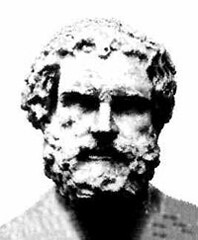 Democritus was an ancient Greek philosopher, the most prolific and influential of the pre-Socratics and whose atomic theory is regarded as the intellectual culmination of early Greek thought. For this atomic theory, which echoes eerily the theoretical formulations of modern physicists, he is sometimes called the "father of modern science." He was well known to Aristotle, and a thorn in the side to Plato - who advised that all of Democritus' works be burned.
Democritus was an ancient Greek philosopher, the most prolific and influential of the pre-Socratics and whose atomic theory is regarded as the intellectual culmination of early Greek thought. For this atomic theory, which echoes eerily the theoretical formulations of modern physicists, he is sometimes called the "father of modern science." He was well known to Aristotle, and a thorn in the side to Plato - who advised that all of Democritus' works be burned.
A cheerful and popular man with the citizenry for his uncanny ability to predict events, his was known among his fans as the "Laughing Philosopher," a title that may well have referred more to his scoffing rejection of assigning to gods the mechanistic operations of nature itself. His cosmology and atomic theory held that the world was spheroid, that there were many worlds and many suns, and that all things manifest in nature were comprised of atoms bound together. There are varying accounts of his age at death, ranging from a ripe 90 all the way to 109 years.
2. Diagoras of Melos
 The first and most ancient of recognized atheists must include a 5th century b.c.e. poet and sophist from Melos known as Diagoras the Atheist. Not content to simply speak against the popular pantheon of Greek gods, he also criticized the Eleusinian Mysteries. He became a disciple of Democritus after that notable philosopher paid a hefty ransom to free Diagoras from captivity following the subjugation of Melos in 416 b.c.e.
The first and most ancient of recognized atheists must include a 5th century b.c.e. poet and sophist from Melos known as Diagoras the Atheist. Not content to simply speak against the popular pantheon of Greek gods, he also criticized the Eleusinian Mysteries. He became a disciple of Democritus after that notable philosopher paid a hefty ransom to free Diagoras from captivity following the subjugation of Melos in 416 b.c.e.
Prosecuted by the Athenian democratic party for impiety in 415 b.c.e., he was forced to flee the city and died in Corinth. None of Diagoras' own writings survive, but in the 1st century b.c.e. ****ro wrote that one of Diagoras' friends tried to convince him that the gods did exist by citing the many people saved from storms by their pleas to their favorite gods, to which Diagoras was purported to reply, "there are nowhere any pictures of those who have been shipwrecked and drowned at sea."
3. Epicurus
 Born in 341 b.c.e. in Athens, Epicurus established the school of philosophy known as Epicureanism, and was a follower of Democritus even though his own philosophy denied the influence of strong determinism and often denounced other philosophies as confused. He was an important figure in the early development of the scientific methodology, insisting that nothing which cannot be tested through direct observation and defended through logical deduction should be believed.
Born in 341 b.c.e. in Athens, Epicurus established the school of philosophy known as Epicureanism, and was a follower of Democritus even though his own philosophy denied the influence of strong determinism and often denounced other philosophies as confused. He was an important figure in the early development of the scientific methodology, insisting that nothing which cannot be tested through direct observation and defended through logical deduction should be believed.
For Epicurus the purpose of philosophy was to attain peace of mind and a happy life, freedom from fear and absence of pain. He considered pleasure and pain the measures of that which is good or evil. He insisted that there were no gods to reward or punish humans after death, that the universe is infinite and eternal, and that all things are ultimately material in nature. Epicurus himself was never able to escape a life of pain or a painful death, as he suffered greatly from kidney stones and died at the age of 72 of complications from that ailment.
4. Theodorus the Atheist
[no image available]
Theodorus the Atheist from Cyrene lived around 300 b.c.e. He was banished from Cyrene in his early years, and moved to Athens to become a follower of the younger Aristippus. He also managed to get himself banished from Athens which caused him to go into the service of Ptolemy in Alexandria. It was in this service that he was sent as an ambassador to Lysimachus, who became offended by Theodorus' free speech as a lack of respect and decorum.
Theodorus taught that the aim of human life was to obtain joy and avoid grief, and that joy comes through prudence while grief arises from folly. Prudence and justice represented good, their opposites evil. Laertius complained that Theodorus "did away with all opinions respecting the Gods," but he may have just rejected the notions of deity popular in his time.
5. Andrew Carnegie
 Andrew Carnegie [1835-1919] was a noted American industrialist, businessman and philanthropist. A Scottish-born immigrant, he established the Carnegie Steel Company in Pittsburgh and later merged it with the Federal Steel Company to become U.S. Steel. He is regarded as the second richest man in history, then he gave most of his steel and railroad fortune away to establish libraries, schools and universities all over America. He limited himself to an income of $50,000 per year, everything else went into good works.
Andrew Carnegie [1835-1919] was a noted American industrialist, businessman and philanthropist. A Scottish-born immigrant, he established the Carnegie Steel Company in Pittsburgh and later merged it with the Federal Steel Company to become U.S. Steel. He is regarded as the second richest man in history, then he gave most of his steel and railroad fortune away to establish libraries, schools and universities all over America. He limited himself to an income of $50,000 per year, everything else went into good works.
He wrote many books on the subjects of wealth and its responsibilities, on social issues and on political philosophy. He self-identified as a positivist, and kept away from organized religion due to his distaste of sectarianism. Carnegie preferred naturalism and science, saying in his autobiography that, "not only had I got rid of the theology and the supernatural, but I had found the truth of evolution."
6. Ivan Pavlov
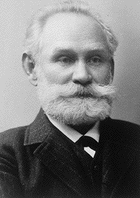 Ivan Petrovich Pavlov [1849-1936] was a Russian physiologist, psychologist and physician. He won the Nobel Prize in medicine in 1904 for research on the digestive system. It was his investigation of the saliva of dogs that first led him to notice that the animals salivated more when they expected food, a phenomenon he termed "psychic secretion." He was particularly interested in studying conditioned behaviors as an experimental model of the induction of neuroses. His approach became known as "behaviorism," and after his death his work was extended by William Sargant and others in an attempt to develop a systematic method for brainwashing and implantation of false memories.
Ivan Petrovich Pavlov [1849-1936] was a Russian physiologist, psychologist and physician. He won the Nobel Prize in medicine in 1904 for research on the digestive system. It was his investigation of the saliva of dogs that first led him to notice that the animals salivated more when they expected food, a phenomenon he termed "psychic secretion." He was particularly interested in studying conditioned behaviors as an experimental model of the induction of neuroses. His approach became known as "behaviorism," and after his death his work was extended by William Sargant and others in an attempt to develop a systematic method for brainwashing and implantation of false memories.
Pavlov died in Leningrad, his laboratory in St. Petersburg was carefully preserved by the Soviet government as a museum. He had one of his students attend him on his deathbed to record the cir****tances of his dying, as if it were just another psychological experiment.
7. Sigmund Freud
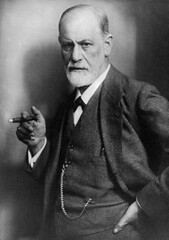 Born Sigismund Schlomo Freud [1856-1939], Freud was an Austrian psychiatrist founded the psychoanalytic school of psychology. Using his theories of the unconscious mind and defense mechanisms of repression, his psychoanalysis sought to cure sufferers of psychopathology through a dialogue between the patient and his psychoanalyst. He had an elaborate system for interpretation of dreams as indicators of unconscious desires, and did early neurological research on cerebral palsy.
Born Sigismund Schlomo Freud [1856-1939], Freud was an Austrian psychiatrist founded the psychoanalytic school of psychology. Using his theories of the unconscious mind and defense mechanisms of repression, his psychoanalysis sought to cure sufferers of psychopathology through a dialogue between the patient and his psychoanalyst. He had an elaborate system for interpretation of dreams as indicators of unconscious desires, and did early neurological research on cerebral palsy.
Despite his ideas falling out of favor or being modified in later years, his methodology and theoretics continue to exert influence in the humanities and some social sciences. Freud's family escaped after Nazi Germany annexed Austria in 1938 and moved to London. He suffered more than 30 operations for oral cancer in his late life, and convinced his physician friend Max Schur to assist his suicide in 1939. His philosophical writings established his strong advocacy for an atheistic world view, and he was eulogized as "the atheist's touchstone" for the 20th century.
8. Clarence Darrow
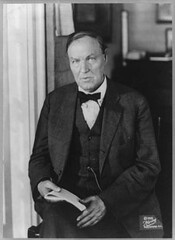 Clarence Seward Darrow [1857-1938] was an American lawyer, a leading member of the ACLU and a notable defense attorney. Starting out as a corporate lawyer for a railroad company, he soon jumped the ideological tracks and represented the leader of the American Railway Union in the Pullman Strike of 1894.
Clarence Seward Darrow [1857-1938] was an American lawyer, a leading member of the ACLU and a notable defense attorney. Starting out as a corporate lawyer for a railroad company, he soon jumped the ideological tracks and represented the leader of the American Railway Union in the Pullman Strike of 1894.
His most famous case was the defense of Tennessee teacher John Scopes in the "Monkey Trial" against the state law that barred the teaching of evolution. The prosecution side was argued by William Jennings Bryan, the the trial served as the story for the play and later film, Inherit the Wind. During the trial Darrow self-identified as an agnostic by saying, "I do not consider it an insult, but rather a compliment to be called an agnostic. I do not pretend to know where many ignorant men are sure - that is all that agnosticism means." Yet he wrote essays with titles like "Absurdities of the Bible" and "The Myth of the Soul," suggesting that his agnosticism was strong enough to be considered atheism.
9. Richard Strauss
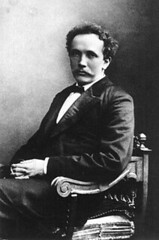 Richard Georg Strauss [1864-1949] was a brilliant German composer who began writing music at the age of six and continued almost until his death. He was noted for his "tone poems" and operas such as Salome and Elektra, which made use of dissonance and generated much public outcry. During the Nazi period he was appointed president of the German State Music Bureau and composed the theme song for the infamous 1936 Summer Olympics in Berlin. He produced the opera Friedenstag in 1938, a thinly veiled criticism of the Third Reich. He is said to have stretched his influence very thin in his efforts to protect his son and Jewish daughter-in-law and their children from the Nazis.
Richard Georg Strauss [1864-1949] was a brilliant German composer who began writing music at the age of six and continued almost until his death. He was noted for his "tone poems" and operas such as Salome and Elektra, which made use of dissonance and generated much public outcry. During the Nazi period he was appointed president of the German State Music Bureau and composed the theme song for the infamous 1936 Summer Olympics in Berlin. He produced the opera Friedenstag in 1938, a thinly veiled criticism of the Third Reich. He is said to have stretched his influence very thin in his efforts to protect his son and Jewish daughter-in-law and their children from the Nazis.
Strauss was dubious of all religion, except perhaps the religion of reason. "I shall never be converted, and I shall remain true to my old religion of the classics until my life's end," he declared shortly before his death.
10. Bertrand Russell
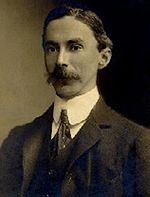 Bertrand Arthur William Russell [1872-1970], 3rd Earl of Russell, was a British philosopher, logician, mathematician, historian, pacifist and social activist. Russell led the revolt against idealism in the early 20th century and is considered along with Wittgenstein and Frege a founder of analytic philosophy, which considers formal logic and science as the principal tools of philosophy. Russell was awarded the Nobel Prize for literature in 1950.
Bertrand Arthur William Russell [1872-1970], 3rd Earl of Russell, was a British philosopher, logician, mathematician, historian, pacifist and social activist. Russell led the revolt against idealism in the early 20th century and is considered along with Wittgenstein and Frege a founder of analytic philosophy, which considers formal logic and science as the principal tools of philosophy. Russell was awarded the Nobel Prize for literature in 1950.
Russell was not fond of organized religion, but expressed some difficulty in defining himself as an agnostic or an atheist. In his 1949 speech, "Am I an Atheist or an Agnostic?" Russell admitted that he could not prove the non-existence of God any more than he could prove the non-existence of the Homeric gods. But in his autobiography he stated, "At the age of eighteen, ...I read Mill's Autobiography, where I found a sentence to the effect that his father taught him the question "Who made me?" cannot be answered, since it immediately suggests the further question "Who made God?" This led me to abandon the "First Cause" argument, and to become an atheist."
11. Jawaharlal Nehru
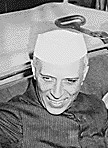 Jawaharlal Nehru [1889-1964] was a follower of Mahatma Gandhi, Nehru rose to leadership of the Indian National Congress at a young age in part due to his charisma and advocacy of complete Indian independence from the British Empire. He was the first and longest serving Prime Minister of an Independent India from 1947 to 1964. His appreciation for parliamentary democracy and concern for the poor allowed him to formulate policies derided by some for their socialist leanings.
Jawaharlal Nehru [1889-1964] was a follower of Mahatma Gandhi, Nehru rose to leadership of the Indian National Congress at a young age in part due to his charisma and advocacy of complete Indian independence from the British Empire. He was the first and longest serving Prime Minister of an Independent India from 1947 to 1964. His appreciation for parliamentary democracy and concern for the poor allowed him to formulate policies derided by some for their socialist leanings.
Nehru enjoyed the honorific title of "Scholar" and despite his family's Hindi religious background, was an atheist. Forging am independent, modern India where educational and social opportunities could been afforded to all citizens regardless of religion or caste, this rejection of any particular belief system in a region hosting such wide diversity no doubt helped him toward his considerable accomplishments.
12. Linus Pauling
 Linus Carl Pauling [1901-1994] was one of the most influential chemists in history as well as one of the most important scientists of the 20th century - or, according to Gautam Desiraju who wrote the Millennium Essay in the journal Nature, one of the greatest thinkers and visionaries of the last thousand years. One of only 4 individuals ever to have won solo Nobel Prizes in separate and unrelated fields - for chemistry in 1954, and the Nobel Peace Prize for his tireless campaign against atmospheric nuclear bomb testing in 1962. His activities in favor of pacifism and against nuclear weapons earned him an appearance before the Senate Internal Security Subcommittee, which explicitly accused him of being in league with the Communists.
Linus Carl Pauling [1901-1994] was one of the most influential chemists in history as well as one of the most important scientists of the 20th century - or, according to Gautam Desiraju who wrote the Millennium Essay in the journal Nature, one of the greatest thinkers and visionaries of the last thousand years. One of only 4 individuals ever to have won solo Nobel Prizes in separate and unrelated fields - for chemistry in 1954, and the Nobel Peace Prize for his tireless campaign against atmospheric nuclear bomb testing in 1962. His activities in favor of pacifism and against nuclear weapons earned him an appearance before the Senate Internal Security Subcommittee, which explicitly accused him of being in league with the Communists.
Pauling's wife Ava Hellen, whom he married in 1917, was a pacifist and peace activist who got him involved in the crusade against nuclear weapons and atmospheric bomb testing. He had been raised Lutheran and later joined the Unitarian Universalist Church, but publicly declared his personal atheism two years before his death of prostate cancer at the age of 93.
13. Paul Dirac
 Paul Adrien Maurice Dirac [1902-1984] was a British theoretical physicist who contributed to the early development of quantum mechanics and quantum electrodynamics [QED]. He shared the 1933 Nobel Prize in physics with Erwin Schrodinger, formulated what became known as the Dirac equation, and held the Cambridge Lucasian Chair in mathematics established by Sir Isaac Newton and currently held by Stephen Hawking.
Paul Adrien Maurice Dirac [1902-1984] was a British theoretical physicist who contributed to the early development of quantum mechanics and quantum electrodynamics [QED]. He shared the 1933 Nobel Prize in physics with Erwin Schrodinger, formulated what became known as the Dirac equation, and held the Cambridge Lucasian Chair in mathematics established by Sir Isaac Newton and currently held by Stephen Hawking.
Dirac was noted for his personal humility, refusing to call his contributions to physics by his own name, and for his somewhat Edwardian sense of social propriety. He married Margrit, the sister of fellow Nobel laureate Eugene Wigner, in 1937. He adopted her two children and the couple had two more. While he once said that "God used beautiful mathematics in creatiing the world," his personal views on religion were far less expansive. Wolfgang Pauli once described Dirac's first commandment concerning religion as, "God does not exist and Paul Dirac is his prophet."
14. Ayn Rand
 Ayn Rand [1905-1982] was a Russian-born writer who emigrated to the U.S. in 1925. Her first play, Night of January 16th, was produced in Hollywood and then on Broadway. Her autobiographical and anti-Soviet novel We the Living, was published in 1936. Best known for her sweeping intellectual masterpiece Atlas Shrugged, the fiction mystery allowed her to fully develop her philosophy of objectivism.
Ayn Rand [1905-1982] was a Russian-born writer who emigrated to the U.S. in 1925. Her first play, Night of January 16th, was produced in Hollywood and then on Broadway. Her autobiographical and anti-Soviet novel We the Living, was published in 1936. Best known for her sweeping intellectual masterpiece Atlas Shrugged, the fiction mystery allowed her to fully develop her philosophy of objectivism.
For the rest of her life Rand lectured and wrote about objectivism, which she termed "a philosophy for living on earth." All of the books Rand published during her lifetime are still in print, and her philosophy is still taught at many major universities as one of the most important philosophical movements in the modern world. Objectivism is particularly prized by dedicated capitalists and economists and underpins much of the wider freethought movement.
15. Katherine Hepburn
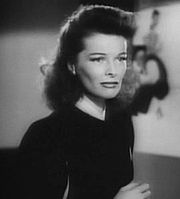 Katherine Houghton Hepburn [1907-2003] was an acclaimed actress in film, television and stage for 73 years of her long life. She received 12 Academy Award nominations for Best Actress in a film, and still holds the record with four wins. In 1999 the American Film Institute ranked Hepburn as cinema history's greatest female star. A child of New England privilege with a genealogical heritage tracing back to Louis IX of France, she received her degree in history and philosophy from Bryn Mawr despite a record of breaking curfew, smoking and skinny dipping in the fountain. She married socialite businessman Ludlow Ogden Smith in 1928, but divorced six years later. Despite several romances, the love of her live was Spencer Tracy, with whom she made nine movies.
Katherine Houghton Hepburn [1907-2003] was an acclaimed actress in film, television and stage for 73 years of her long life. She received 12 Academy Award nominations for Best Actress in a film, and still holds the record with four wins. In 1999 the American Film Institute ranked Hepburn as cinema history's greatest female star. A child of New England privilege with a genealogical heritage tracing back to Louis IX of France, she received her degree in history and philosophy from Bryn Mawr despite a record of breaking curfew, smoking and skinny dipping in the fountain. She married socialite businessman Ludlow Ogden Smith in 1928, but divorced six years later. Despite several romances, the love of her live was Spencer Tracy, with whom she made nine movies.
In a 1973 interview on The Dick Cavett Show Hepburn said that while she agreed with Christian principles and thought highly of Jesus Christ, she had no personal religious beliefs nor any belief in an afterlife. "I am an atheist and that's it. I believe there's nothing we can know except that we should be kind to each other and do what we can for other people."
16. Jacques Monod
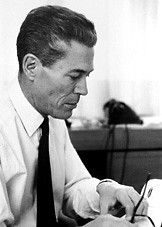 Jacques Lucien Monod [1910-1976] was a French biologist who contributed greatly to the understanding of the Lac operon as a regulator of gene transcription in cells, suggested the existence of mRNA molecules in the process of protein synthesis, and further contributed to the field of enzymology. He was awarded the Nobel Prize in Physiology or Medicine in 1965. He married archeologist and orientalist Odette Bruhl in 1938, they had twin sons, Oliver and Phillippe, one of whom became a geologist, the other a physicist.
Jacques Lucien Monod [1910-1976] was a French biologist who contributed greatly to the understanding of the Lac operon as a regulator of gene transcription in cells, suggested the existence of mRNA molecules in the process of protein synthesis, and further contributed to the field of enzymology. He was awarded the Nobel Prize in Physiology or Medicine in 1965. He married archeologist and orientalist Odette Bruhl in 1938, they had twin sons, Oliver and Phillippe, one of whom became a geologist, the other a physicist.
Monod wrote the book Chance and Necessity in 1970, which became a popular primer on the relationship between the roles of random chance and adaptation in biological evolution and provided much ammunition to the atheist community by proposing that the natural sciences revealed an entirely purposeless world that undermines the traditional claims of the world's religions. His views also contributed to the development of the idea of "Memes" that Richard Dawkins made famous in his writings.
17. Subrahmanyan Chandresekhar
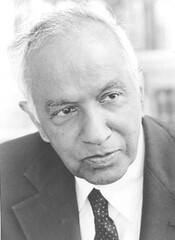 Padma Vibhushan Subrahmanyan Chandresekhar [1910-1995] - better known by his nickname "Chandra" - has a space-based X-ray observatory named after him, launched by the space shuttle Columbia on July 23, 1999. Awarded the Nobel Prize in Physics in 1983 for his important contributions to knowledge about the evolution of stars, he is probably better known for his 1995 opus >Newton's Principia for the Common Reader which explains the detailed arguments of Newton's original Principia using the language and methods of ordinary calculus.
Padma Vibhushan Subrahmanyan Chandresekhar [1910-1995] - better known by his nickname "Chandra" - has a space-based X-ray observatory named after him, launched by the space shuttle Columbia on July 23, 1999. Awarded the Nobel Prize in Physics in 1983 for his important contributions to knowledge about the evolution of stars, he is probably better known for his 1995 opus >Newton's Principia for the Common Reader which explains the detailed arguments of Newton's original Principia using the language and methods of ordinary calculus.
A naturalized American citizen born in Lahore, India, Chandra's family long displayed signs of brilliance, even genius. His father was a government worker and accomplished violinist who wrote several books on musicology. His mother was an intellectual noted for translating Ibsen's A Doll's House into the Tamil language. His paternal uncle was physicist C.V. Raman, who also won a Nobel Prize.
18. Alan Turing
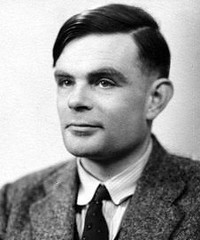 Alan Mathison Turing [1912-1954] was a mathematician, logician, computer scientist and cryptanalyst from England. He displayed distinct signs of genius early in his life, solving advanced problems without having studied elementary calculus. At the age of 16 he encountered Einstein's work and extrapolated it to question Newton's laws of motion from a text in which this challenge was not made explicit. Perhaps his most momentous achievement was his 1936 paper reformulating Kurt Godel's results on the limits of proof and computation, replacing Godel's arithmetic-based formal language with what are now known as Turing machines - formal and simple devices.
Alan Mathison Turing [1912-1954] was a mathematician, logician, computer scientist and cryptanalyst from England. He displayed distinct signs of genius early in his life, solving advanced problems without having studied elementary calculus. At the age of 16 he encountered Einstein's work and extrapolated it to question Newton's laws of motion from a text in which this challenge was not made explicit. Perhaps his most momentous achievement was his 1936 paper reformulating Kurt Godel's results on the limits of proof and computation, replacing Godel's arithmetic-based formal language with what are now known as Turing machines - formal and simple devices.
It was the death of Turing's first love in their last year at Sherborne from complications of bovine tuberculosis (contracted from drinking infected milk as a boy) that shattered Turing's religious faith. He became an atheist with a firm conviction that all phenomena must be materialistic in nature.
19. Francis Crick
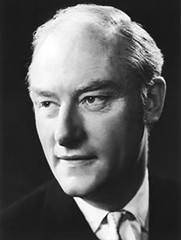 Francis Harry Compton Crick [1916-2004] is best known as the co-discoverer of the structure of DNA. He first coined the term "central dogma" to describe the flow of genetic information in cells as a one-way street - DNA to RNA to protein. His primary interests encompassed two fundamental problems in biology. How non-living molecules become living organisms, and how the human brain creates a conscious mind.
Francis Harry Compton Crick [1916-2004] is best known as the co-discoverer of the structure of DNA. He first coined the term "central dogma" to describe the flow of genetic information in cells as a one-way street - DNA to RNA to protein. His primary interests encompassed two fundamental problems in biology. How non-living molecules become living organisms, and how the human brain creates a conscious mind.
On the matter of religion, Crick once said, "Christianity may be okay between consenting adults in private, but should not be taught to young children." In his book Of Molecules and Men he expressed his strong views on the relationship between science and religion. Those views continued to play a role in his work when he transitioned from molecular biology into theoretical neuroscience.
20. Claude Shannon
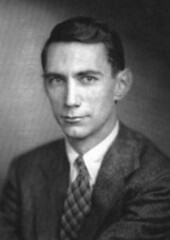 Claude Elwood Shannon [1916-2001] was an electronic engineer and mathematician known as "the father of information theory." While at the University of Michigan he was introduced to the works of George Boole, and once in grad school at MIT working with the 'differential analyzer', an early analog computer, he saw that Boole's concepts could be used used to simplify the complicated circuitry of the analyzer and wrote his master's thesis on what became known as Boolean logic. His PhD thesis at MIT applied this work to establish mathematical relationships in Mendelian genetics. He became a National Research Fellow at the Institute for Advanced Study at Princeton, and worked freely across disciplines with other notable scientists to shape the ideas that became information theory.
Claude Elwood Shannon [1916-2001] was an electronic engineer and mathematician known as "the father of information theory." While at the University of Michigan he was introduced to the works of George Boole, and once in grad school at MIT working with the 'differential analyzer', an early analog computer, he saw that Boole's concepts could be used used to simplify the complicated circuitry of the analyzer and wrote his master's thesis on what became known as Boolean logic. His PhD thesis at MIT applied this work to establish mathematical relationships in Mendelian genetics. He became a National Research Fellow at the Institute for Advanced Study at Princeton, and worked freely across disciplines with other notable scientists to shape the ideas that became information theory.
Shannon and his wife Betty put their collective mathematical and analytical abilities together in a game theory for many successful visits to the gaming tables in Las Vegas and made a fortune. An even bigger fortune was made later by Shannon and colleague Ed Thorp when they applied the same theory (later known as the Kelly criterion) to the stock market.
21. Richard Feynman
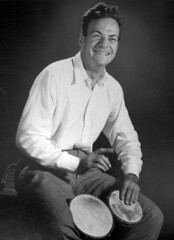 Richard Phillips Feynman [1918-1988] contributed much to the development of quantum mechanics, including what became known as Feynman diagrams, the path integral formulation, the theory of quantum electrodynamics [QED], the physics supercooled liquid helium's superfluidity, and the parton model of particle physics. He won the Nobel Prize in 1965 for QED and became one of the best known scientists in the world through his popular books and lectures about physics and about his own storied life.
Richard Phillips Feynman [1918-1988] contributed much to the development of quantum mechanics, including what became known as Feynman diagrams, the path integral formulation, the theory of quantum electrodynamics [QED], the physics supercooled liquid helium's superfluidity, and the parton model of particle physics. He won the Nobel Prize in 1965 for QED and became one of the best known scientists in the world through his popular books and lectures about physics and about his own storied life.
Among his colleagues he was perhaps better known as a beatnik and clown, always thinking up clever pranks or juggling or sitting in with any impromptu band playing bongos. Some of his other interests were painting, biology, Mayan hieroglyphics and lock-picking. He was dubbed the "Great Explainer" for two masterful lecture series on physics at Cal Tech (which were later turned into the books Six Easy Pieces and Six Not So Easy Pieces. He developed two rare forms of cancer late in his life, complaining that, "I'd hate to die twice. It's so boring." In the end, he died after surgery for only one of them.
22. Noam Chomsky
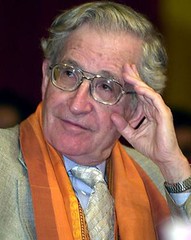 Avram Noam Chomsky [b. 1928] is one of the most notable American philosophers of any age. Professor emeritus of linguistics at MIT, and is considered a father of modern linguistics. Also a prolific writer, he has also become famous for being an outspoken political dissident, anarchist, humanist freethinker and libertarian socialist.
Avram Noam Chomsky [b. 1928] is one of the most notable American philosophers of any age. Professor emeritus of linguistics at MIT, and is considered a father of modern linguistics. Also a prolific writer, he has also become famous for being an outspoken political dissident, anarchist, humanist freethinker and libertarian socialist.
Beginning with his 1959 critique of B.F. Skinner's behaviorist theory of language, Chomsky has iterated and refined his own theory of linguistics as a branch of cognitive psychology. This view drew much criticism from behaviorists, particularly his hypothesis that humans share an innate linguistic capability. On his views of religion, Chomsky said in a Common Sense interview in 2002, "...if you ask me whether or not I'm an atheist, I wouldn't even answer. I would first want an explanation of what it is that I'm supposed not to believe in, and I've never seen an explanation."
23. James D. Watson
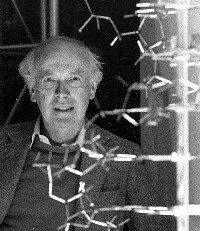 James Dewey Watson [b. 1928] received the Nobel Prize in physiology or medicine in 1962 as co-discoverer along with Francis Crick and Maurice Wilkins of the molecular structure of DNA. Watson began his Ph.D. research with Salvador Luria, who later earned his own Nobel for work with Max Delbruck on phages. It was from this association with the leaders of the "Phage Group" of molecular biologists that he became involved in the search for the nature of genes. He earned that Ph.D. in zoology from Indiana University at the age of 22.
James Dewey Watson [b. 1928] received the Nobel Prize in physiology or medicine in 1962 as co-discoverer along with Francis Crick and Maurice Wilkins of the molecular structure of DNA. Watson began his Ph.D. research with Salvador Luria, who later earned his own Nobel for work with Max Delbruck on phages. It was from this association with the leaders of the "Phage Group" of molecular biologists that he became involved in the search for the nature of genes. He earned that Ph.D. in zoology from Indiana University at the age of 22.
Watson was politically active in opposition to the war in Vietnam and nuclear proliferation, active in environmentalism. When asked by a student if he believed in God, Watson answered, "Oh, no. Absolutely not... The biggest advantage to believing in God is you don't have to understand anything, no physics, no biology. I wanted to understand."
24. Peter Higgs
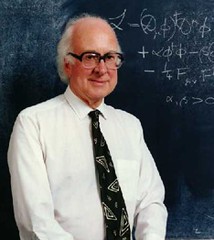 Peter Ware Higgs [b. 1929] is a theoretical physicist and emeritus professor at the University of Edinburgh in Scotland. He is a recipient of the 1997 Dirac Medal and Prize for outstanding contributions to theoretical physics, the High Energy and Particle Physics Prize by the European Physical Society, and the Wolf Prize in physics. If his predicted Higgs particle - the field boson imparting mass to matter - is discovered as expected by the Large Hadron Collider at CERN and he is still alive, Higgs is expected to receive the Nobel Prize in physics within the year.
Peter Ware Higgs [b. 1929] is a theoretical physicist and emeritus professor at the University of Edinburgh in Scotland. He is a recipient of the 1997 Dirac Medal and Prize for outstanding contributions to theoretical physics, the High Energy and Particle Physics Prize by the European Physical Society, and the Wolf Prize in physics. If his predicted Higgs particle - the field boson imparting mass to matter - is discovered as expected by the Large Hadron Collider at CERN and he is still alive, Higgs is expected to receive the Nobel Prize in physics within the year.
Higgs describes himself as an atheist, but expresses discomfort with one of the designations of his field boson, the "God Particle." That designation was popularized by Nobel Laureate Leon Lederman in his book by that title, published in 1993 as part of a PR campaign in favor of the proposed Superconducting Super Collider [SSC] proposed to be built in Texas. Higgs lives a reserved life and is not anxious to offend religious believers.
25. Warren Buffet
 Warren Edward Buffett [b. 1930] is an American businessman and CEO of Berkshire Hathaway rated by Forbes as the richest person in the world (in the first half of 2008, before the Wall Street meltdown). He is noted for adherence to the philosophy of "value investing" and for accepting an annual salary for himself of less than $200,000. Compare that to what taxpayers are now paying the CEOs of failed Wall Street investment firms!
Warren Edward Buffett [b. 1930] is an American businessman and CEO of Berkshire Hathaway rated by Forbes as the richest person in the world (in the first half of 2008, before the Wall Street meltdown). He is noted for adherence to the philosophy of "value investing" and for accepting an annual salary for himself of less than $200,000. Compare that to what taxpayers are now paying the CEOs of failed Wall Street investment firms!
Buffett is further noted for his philanthropy, a passion he shares with fellow billionaire Bill Gates, along with a weekly bridge play date. In 2006 Buffett announced that 83% of his fortune would be going to the Bill and Melinda Gates Foundation for further philanthropy. He describes himself as religiously agnostic. In Roger Lowenstein's 1995 biography Buffett: The Making of an American Capitalist, he is described and non-religious. "He adopted his father's ethical underpinnings, but not his belief in an unseen divinity."
26. John Searle
 John Rogers Searle [b. 1932] is an American philosopher whose contributions to the philosophy of mind, philosophy of language and social philosophy made him an influential member and spokesperson for the Free Speech Movement in Berkeley during the late 1960s and early '70s.
John Rogers Searle [b. 1932] is an American philosopher whose contributions to the philosophy of mind, philosophy of language and social philosophy made him an influential member and spokesperson for the Free Speech Movement in Berkeley during the late 1960s and early '70s.
Drawing upon his theory of intentionality, Searle argued in his 1992 book The Rediscovery of the Mind that much of modern philosophy has attempted to deny the existence of consciousness, with little success among conscious people. The primary issue Searle identifies is a philosophical false dichotomy between strong materialism and subjective, first-person experience of the world. What emerged from his resolution is a view he calls "biological naturalism" - that consciousness is real, caused by the physical processes of the brain. Searle is regarded as an atheist who believes in freedom of will and has argued eloquently (and controversially) for that position.
27. Steven Weinberg
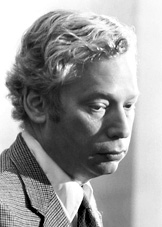 Steven Weinberg [b. 1933] is an American physicist best known for his work on unification of electromagnetism and the weak force, for which he shared the Nobel Prize in physics in 1979. It was as a visiting professor at MIT in 1967 that he first proposed his electroweak unification theory, which predicted the existence of the Z boson and the existence of a mechanism of mass later known as the Higgs boson. In 1973 he proposed a modification of the Standard Model of physics did not predict the Higgs, but there is as yet no consensus.
Steven Weinberg [b. 1933] is an American physicist best known for his work on unification of electromagnetism and the weak force, for which he shared the Nobel Prize in physics in 1979. It was as a visiting professor at MIT in 1967 that he first proposed his electroweak unification theory, which predicted the existence of the Z boson and the existence of a mechanism of mass later known as the Higgs boson. In 1973 he proposed a modification of the Standard Model of physics did not predict the Higgs, but there is as yet no consensus.
Weinberg has been prominent in the science vs. religion 'culture wars'. His popular science books and articles combine explaining science in the added context of history, philosophy of science, and atheism. In a 1999 speech in Washington, D.C., he said, "With or without religion, good people can behave well and bad people can do evil; but for good people to do evil - that takes religion."
28. Carl Sagan
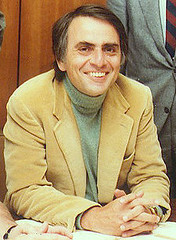 Carl Edward Sagan [1934-1996] was an American astronomer, astrochemist, and successful popularizer of science.Sagan was connected to the American space program from the beginning, working as an advisor to NASA from the 1950s. He contributed to many of the robotic missions that explored the solar system and arranged experiments to be conducted during manned moon missions. He designed the gold placque attached to the Pioneer 10 and 11 spacecraft, a message that could be understood by an extraterrestrial intelligence that encountered it.
Carl Edward Sagan [1934-1996] was an American astronomer, astrochemist, and successful popularizer of science.Sagan was connected to the American space program from the beginning, working as an advisor to NASA from the 1950s. He contributed to many of the robotic missions that explored the solar system and arranged experiments to be conducted during manned moon missions. He designed the gold placque attached to the Pioneer 10 and 11 spacecraft, a message that could be understood by an extraterrestrial intelligence that encountered it.
Sagan was an outspoken opponent of nuclear weapons and starred in the popular PBS television series Cosmos: A Personal Voyage. Noted as a skeptic who advocated for humanist ideals, the public considered him an atheist. Sagan called himself an agnostic instead, explaining that "an atheist has to know a lot more than I know" in order to make a positive assertion that no deity exists.
29. David Suzuki
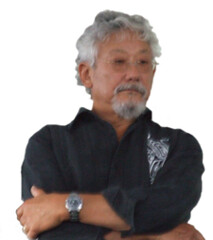 David Takayoshi Suzuki [b. 1936] is a Canadian zoologist, geneticist, science broadcaster and entironmental activist. His work in television began in 1970 with the weekly children's series, Suzuki on Science, going on to host CBC's The Nature of Things and the acclaimed PBS series A Planet for the Taking. He also worked in radio, hosting CBC Radio One's Quirks and Quarks, and a weekly program for more mature audiences called Science Magazine. He has also written several books about science and environmentalism, is an outspoken critic of global climate change corporate deniers and established the David Suzuki Foundation to promote sustainability.
David Takayoshi Suzuki [b. 1936] is a Canadian zoologist, geneticist, science broadcaster and entironmental activist. His work in television began in 1970 with the weekly children's series, Suzuki on Science, going on to host CBC's The Nature of Things and the acclaimed PBS series A Planet for the Taking. He also worked in radio, hosting CBC Radio One's Quirks and Quarks, and a weekly program for more mature audiences called Science Magazine. He has also written several books about science and environmentalism, is an outspoken critic of global climate change corporate deniers and established the David Suzuki Foundation to promote sustainability.
Though he has been often accused by his critics of turning his environmental causes into a religion of its own, Suzuki describes himself in his autobiography as an atheist with no illusions about life and death.
30. George Carlin
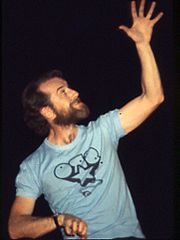 George Denis Patrick Carlin [1937-2008] was one of the most popular and controversial comedians during his lifetime, having won five Grammy awards for his comedy albums. He was the very first guest host for Saturday Night Live and is considered one of the most brilliant satirists of American culture. He was most noted for his focus on psychology, religion, the English language and any other subject that might shock and delight his audiences. He came in second on the Comedy Central network's list of 100 Greatest Comedians of all time.
George Denis Patrick Carlin [1937-2008] was one of the most popular and controversial comedians during his lifetime, having won five Grammy awards for his comedy albums. He was the very first guest host for Saturday Night Live and is considered one of the most brilliant satirists of American culture. He was most noted for his focus on psychology, religion, the English language and any other subject that might shock and delight his audiences. He came in second on the Comedy Central network's list of 100 Greatest Comedians of all time.
Just four days before his death the Kennedy Center for the Performing Arts announced that he would receive the Mark Twain Prize for American Humor. An outspoken atheist, Carlin joked in his book Brain Droppings that he worshipped the sun because he could actually see it. He also introduced in an HBO special the "Two Commandments," a condensed version of the ten ending with one additional commandment, "Thou Shalt keep thy religiion to thyself."
31. Bruce Lee
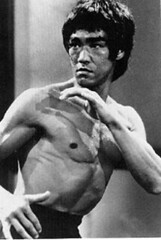 Bruce Jun Fan Lee [1940- 1973] was an American born Chinese martial artist, philosopher, instructor and actor, the founder of the Jeet Kune Do combat form. When he turned to development of his martial arts form in the 1960s, he also became notable for his views and practices of promoting peak physical fitness with proper training, diet and vitamin supplements. Bodybuilder Arnold Schwarzenegger was influenced by Lee, described his physique as defined, with very little body fat. "I mean, he probably had one of the lowest body fat counts of any athlete. And I think that's why he looked so unbelievable."
Bruce Jun Fan Lee [1940- 1973] was an American born Chinese martial artist, philosopher, instructor and actor, the founder of the Jeet Kune Do combat form. When he turned to development of his martial arts form in the 1960s, he also became notable for his views and practices of promoting peak physical fitness with proper training, diet and vitamin supplements. Bodybuilder Arnold Schwarzenegger was influenced by Lee, described his physique as defined, with very little body fat. "I mean, he probably had one of the lowest body fat counts of any athlete. And I think that's why he looked so unbelievable."
Lee had majored in philosophy at the University of Washington and kept an extensive library of philosophy. His first book expressed a well-developed philosophical outlook and was entitled Chinese Gung-Fu: The Philosophical Art of Self Defense. As he developedJeet Kune Do he cited influence from Taoism, Jiddu Krishnamurti and Buddhism, but was himself an atheist who expressed disbelief in God.
32. Leonard Susskind
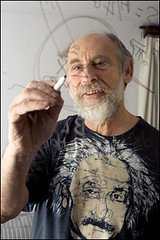 Leonard Susskind [b. 1940] is an American physicist specializing in string theory and quantum field theory. He is Felix Bloch professor of theoretical physics at Stanford. He is a notable promoter of public understanding of science, and his entire course on quantum physics can be downloaded on the iTunes platform from Stanford. His contrubutions to theoretical physics are voluminous, including the independent discovery of string theory, the theory of quark confinement, the development of Hamiltonian lattice gauge theory, the holography principle, the string theory of black hole entropy and the principle of "black hole complementarity."
Leonard Susskind [b. 1940] is an American physicist specializing in string theory and quantum field theory. He is Felix Bloch professor of theoretical physics at Stanford. He is a notable promoter of public understanding of science, and his entire course on quantum physics can be downloaded on the iTunes platform from Stanford. His contrubutions to theoretical physics are voluminous, including the independent discovery of string theory, the theory of quark confinement, the development of Hamiltonian lattice gauge theory, the holography principle, the string theory of black hole entropy and the principle of "black hole complementarity."
Susskind is also a popular speaker for both science and against religious creationism. In a review of the book, The Cosmic Landscape: String Theory and the Illusion of Intelligent Design, Michael Duff wrote that Susskind is "a card-carrying atheist."
33. Stephen Jay Gould
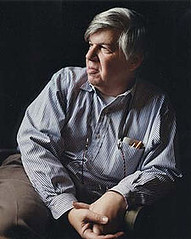 Stephen Jay Gould [1941-2002] was a paleontologist, evolutionary biologist and historian of science who became one of the most influential popularizers of evolutionary biology through his books and essays. Though a critic of the deterministic view of human behavior and society, he contributed much to expanding upon the mechanisms of natural evolution. He generated some controversy with A Scientific Dissent from Darwinism, taking issue with the gradualism and reductionism of orthodox neodarwinists. He contributed "Punctuated Equilibrium" to the evolutionary lexicon to explain the fossil evidence of abrupt changes in organismic form interspersed with long periods of stability.
Stephen Jay Gould [1941-2002] was a paleontologist, evolutionary biologist and historian of science who became one of the most influential popularizers of evolutionary biology through his books and essays. Though a critic of the deterministic view of human behavior and society, he contributed much to expanding upon the mechanisms of natural evolution. He generated some controversy with A Scientific Dissent from Darwinism, taking issue with the gradualism and reductionism of orthodox neodarwinists. He contributed "Punctuated Equilibrium" to the evolutionary lexicon to explain the fossil evidence of abrupt changes in organismic form interspersed with long periods of stability.
Himself an atheist, Gould was an advocate for what he called "Non-Overlapping Magisteria" [NOMA] as a way to resolve the conflicts between science and religion. "Science and religion occupy two separate realms of human experience," he wrote in Rock of Ages. "Demanding that they be combined detracts from the glory of each."
34. Richard Dawkins
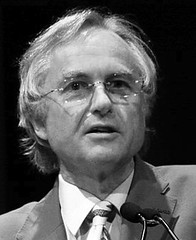 Clinton Richard Dawkins [b. 1941] is the most prominent scientific atheist in the world today, and was the Simonyi Professor for the Public Understanding of Science at Oxford until his retirement in 2008. Dawkins' particular brilliance is not so much reflected in radical discoveries in his field of biology, but in his popular science writings like his books The Selfish Gene and The Extended Phenotype. He has been called "Darwin's Rottweiler" in the press for his strong support of evolution by natural selection. He has also written against creationism in the book The Blind Watchmaker and against theism in A Devil's Chaplain and The God Delusion, both popular best-sellers.
Clinton Richard Dawkins [b. 1941] is the most prominent scientific atheist in the world today, and was the Simonyi Professor for the Public Understanding of Science at Oxford until his retirement in 2008. Dawkins' particular brilliance is not so much reflected in radical discoveries in his field of biology, but in his popular science writings like his books The Selfish Gene and The Extended Phenotype. He has been called "Darwin's Rottweiler" in the press for his strong support of evolution by natural selection. He has also written against creationism in the book The Blind Watchmaker and against theism in A Devil's Chaplain and The God Delusion, both popular best-sellers.
An engaging and energetic speaker, Dawkins promotes atheism as senior editor and columnist for the Council for Secular Humanism's Free Inquiry magazine, and as a member of the editorial board of Skeptic magazine since it was founded. In2006 Dawkins founded the Richard Dawkins Foundation for Reason and Science, and in 2007 founded the atheist "Out" campaign, and in 2008 he supported the Atheist Bus Campaign, Britain's first atheist advertising blitz.
35. Daniel Dennett
 Daniel Clement Dennett [b. 1942] is an American philosopher specializing in the philosophies of mind, science and biology. Dennett's father was a spy for the OSS, disguised as a cultural attache in Beirut during WW-2. He died in a plane crash in 1947 and the family moved back to the U.S. Dennett enjoyed study under a number of notable philosophers at Harvard and Oxford, and is currently a professor of philosophy and co-director of the Center for Cognitive Studies at Tufts University.
Daniel Clement Dennett [b. 1942] is an American philosopher specializing in the philosophies of mind, science and biology. Dennett's father was a spy for the OSS, disguised as a cultural attache in Beirut during WW-2. He died in a plane crash in 1947 and the family moved back to the U.S. Dennett enjoyed study under a number of notable philosophers at Harvard and Oxford, and is currently a professor of philosophy and co-director of the Center for Cognitive Studies at Tufts University.
Dennett's popular work in philosophy of mind and cognitive science, the books Content and Consciousness and Consciousness Explained reflect an expansive and detailed development of his philosophical ideas that have generated some heated debates among his peers. In the book Breaking the Spell Dennett examines religious beliefs from an evolutionary point of view as social adaptations that conveyed selective advantages to the species.
36. Stephen Hawking
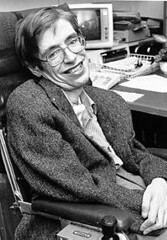 Stephen William Hawking [b. 1942] is the Lucasian Professor of Mathematics at Cambridge, a position once held by Sir Isaac Newton. He is recognized as one of the most creatively intelligent people of the modern scientific age, best known his contributions to the fields of cosmology, quantum gravity and general relativity, as well as for his best-selling popular science books. He developed ALS (Lou Gehrig's disease) in graduate school in Cambridge and has survived with the condition longer than was thought possible. he has almost no neuromuscular control and must communicate via a speech synthesizer.
Stephen William Hawking [b. 1942] is the Lucasian Professor of Mathematics at Cambridge, a position once held by Sir Isaac Newton. He is recognized as one of the most creatively intelligent people of the modern scientific age, best known his contributions to the fields of cosmology, quantum gravity and general relativity, as well as for his best-selling popular science books. He developed ALS (Lou Gehrig's disease) in graduate school in Cambridge and has survived with the condition longer than was thought possible. he has almost no neuromuscular control and must communicate via a speech synthesizer.
Hawking sometimes comes across quite like a deist in his popular writings, particularly in the book, A Brief History of Time, in which most of the questions posed of the universe also echo questions traditionally asked of God. In that book Hawking expounded upon his "no boundary" model by stating, "If the no boundary proposal is correct, He [God] had no freedom at all to choose initial conditions.". While he does not publicly profess atheism, Hawking does profess agnosticism.
37. Mick Jagger
 Sir Michael Philip "Mick" Jagger [b. 1943] was expected by his family to become a teacher, like his father and grandfather, but what he really loved to do was sing. He was a capable student and went to the London School of Economics on scholarship. In his off time he took to being a pick-up singer in London's club scene, developing a small fan following even though he had no formal musical training. He left school at 19 to follow his musical ambitions. He and friends Keith Richards and Brian Jones formed a band called the Rolling Stones, and the rest is history.
Sir Michael Philip "Mick" Jagger [b. 1943] was expected by his family to become a teacher, like his father and grandfather, but what he really loved to do was sing. He was a capable student and went to the London School of Economics on scholarship. In his off time he took to being a pick-up singer in London's club scene, developing a small fan following even though he had no formal musical training. He left school at 19 to follow his musical ambitions. He and friends Keith Richards and Brian Jones formed a band called the Rolling Stones, and the rest is history.
Having become one of the wealthiest musicians in the world - and a Knight of the Realm as of 2003 as well - Jagger founded his own film company with Victoria Pearman in 1995, Jagged Films. A notorious womanizer, Jagger has seven children by 4 women (two of whom he married), and four grandchildren. Not bad for a fabulously wealthy, world famous economics school dropout.
38. Richard Leakey
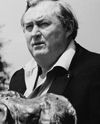 Richard Erskine Frere Leakey [b. 1944] was born in Nairobi, Kenya, one of three sons of noted archaeologists Louis and Mary Leakey. By 1962 he'd earned a private pilot's license and began offering aerial tours of Olduvai. Noting a potential fossil bed, he went back with an associate of his father's and was given the funding for a month's dig. Soon he and his business partner Kimoya Kameu discovered Australopithecus boisei. His storied career has been set with his accomplishments as a conservationist, a promoter of civil rights and a supporter of the Kenyan Safina Party.
Richard Erskine Frere Leakey [b. 1944] was born in Nairobi, Kenya, one of three sons of noted archaeologists Louis and Mary Leakey. By 1962 he'd earned a private pilot's license and began offering aerial tours of Olduvai. Noting a potential fossil bed, he went back with an associate of his father's and was given the funding for a month's dig. Soon he and his business partner Kimoya Kameu discovered Australopithecus boisei. His storied career has been set with his accomplishments as a conservationist, a promoter of civil rights and a supporter of the Kenyan Safina Party.
In a 2007 interview upon his induction into the Academy of Achievement for his contributions to paleoanthropology and environmentalism he said, "I simply would not accede to being forced into this, and would frequently be kept out of classes because of irreverent comments and mocking this religious stuff. Frankly, it stayed with me to this day. In fact, don't get me going. I'm almost as bad as Richard Dawkins on this issue."
39. David Gilmour
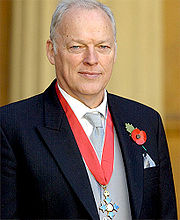 David Jon Gilmour [b. 1946] of the legendary rock group Pink Floyd was born in Cambridge, England, son of a senior lecturer in zoology at Cambridge University. His interest in music, writing and a life on the road led him into musical and busking adventures during the early 1960s, and finally to Pink Floyd in 1967, which went on to become one of the top grossing rock bands in history. On his 60th birthday he released his third solo album, On An Island, which debuted #1 on the UK charts.
David Jon Gilmour [b. 1946] of the legendary rock group Pink Floyd was born in Cambridge, England, son of a senior lecturer in zoology at Cambridge University. His interest in music, writing and a life on the road led him into musical and busking adventures during the early 1960s, and finally to Pink Floyd in 1967, which went on to become one of the top grossing rock bands in history. On his 60th birthday he released his third solo album, On An Island, which debuted #1 on the UK charts.
Gilmour has a penchant for philanthropy, support whi*****ludes housing funds for the homeless, Oxfam, Greenpeace, Amnesty International, the Lung Foundation and others. He was made a Commander in the Order of the British Empire in 2005, an honor just below full knighthood. His On An Island has been called "the most spiritual album ever made by an avowed atheist."
40. Brian Eno
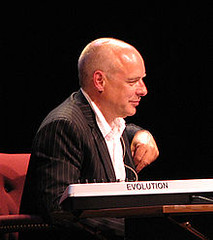 Brian Peter George St. John le Baptiste de la Salle Eno [b. 1948] is an English musician, composer, record producer, music theorist and singer best known as the father of ambient music. Starting with the art rock band Roxy Music in 1971, he became bored with the rock and roll lifestyle quickly. He then became a prominent member of the performance art/classical music orchestra the Portsmouth Sinfonia from 1972-74, and developed his highly eclectic, ambient style in a series of solo albums.
Brian Peter George St. John le Baptiste de la Salle Eno [b. 1948] is an English musician, composer, record producer, music theorist and singer best known as the father of ambient music. Starting with the art rock band Roxy Music in 1971, he became bored with the rock and roll lifestyle quickly. He then became a prominent member of the performance art/classical music orchestra the Portsmouth Sinfonia from 1972-74, and developed his highly eclectic, ambient style in a series of solo albums.
As a producer he contributed to recordings by Genesis, David Bowie, Zvuki Mu and Robert Calvert. He composed and performed the "Prophesy Theme" for David Lynch's Dune, and produced Laurie Anderson's Bright Red album, among many other projects in music, performance and fine art, literature, theatrical soundscapes and sound bytes for iPhone, Windows and video games. When not being a prolific and brilliant artist, Eno is politically active, a humanist with strong anti-war and futurist views.
41. David Sloan Wilson
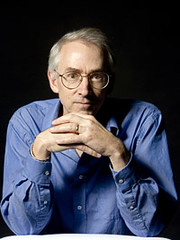 David Sloan Wilson [b. 1949] is SUNY Distinguished Professor of Biology and Anthropology at Binghamton University in New York, a prolific popular science writer, and a promoter of evolution by group and multi-level selection. He has been vice president of the American Society of Naturalists and serves on the editorial board of the Human Behavior and Evolution Society. In his Evolutionary Studies program at Binghamton students study not only the sciences related to evolution, but also religion and the psychology of religion in terms of evolution.
David Sloan Wilson [b. 1949] is SUNY Distinguished Professor of Biology and Anthropology at Binghamton University in New York, a prolific popular science writer, and a promoter of evolution by group and multi-level selection. He has been vice president of the American Society of Naturalists and serves on the editorial board of the Human Behavior and Evolution Society. In his Evolutionary Studies program at Binghamton students study not only the sciences related to evolution, but also religion and the psychology of religion in terms of evolution.
Wilson, who describes himself as a "nice atheist," views religions as a sort of mega-trait that evolved because it conferred advantages on believers. He explored this theme in his book, Darwin's Cathedral: Evolution, Religion and the Nature of Society. Not a supporter of Richard Dawkins' public efforts to organize atheists, Wilson described atheism as a "Stealth Religion" on the political blog Huffington Post in 2007.
42. Steve Wozniak
 Stephen Gary "Woz" Wozniak [b. 1950] is a computer engineer who founded the Apple computer company with Steve Jobs. The two became friends while working on a mainframe during the summer of 1970. The two sold some possessions to raise $1,300, assembled the first prototypes in Job's garage. They formed the company on April 1, 1976 and priced their Apple I personal computer at $666.66 - Woz later claimed he had no idea about the correlation with the mark of the beast).
Stephen Gary "Woz" Wozniak [b. 1950] is a computer engineer who founded the Apple computer company with Steve Jobs. The two became friends while working on a mainframe during the summer of 1970. The two sold some possessions to raise $1,300, assembled the first prototypes in Job's garage. They formed the company on April 1, 1976 and priced their Apple I personal computer at $666.66 - Woz later claimed he had no idea about the correlation with the mark of the beast).
Wozniak is a committed philanthropist, funding various educational projects, and has even taught fifth graders. Since leaving Apple he founded other ventures to produce things like the first universal remote and wireless GPS. He's a member of the Silicon Valley Aftershocks Segway polo team, which won the 2008 Woz Challenge Cup. Woz calls himself "atheist or agnostic," in that he says he doesn't know the difference between the designations.
43. Douglas Adams
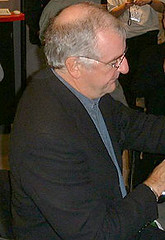 Douglas Noel Adams [1952-2001] was an English writer, dramatist and musician, best known for his Hitchhiker's Guide to the Galaxy series. He also wrote three episodes of the BBC series Doctor Who for his friend Russell T Davies and served as script editor during the seventh season. He further wrote for and appeared in Monty Python's Flying Circus, and counted Pink Floyd guitarist David Gilmour among his closest friends.
Douglas Noel Adams [1952-2001] was an English writer, dramatist and musician, best known for his Hitchhiker's Guide to the Galaxy series. He also wrote three episodes of the BBC series Doctor Who for his friend Russell T Davies and served as script editor during the seventh season. He further wrote for and appeared in Monty Python's Flying Circus, and counted Pink Floyd guitarist David Gilmour among his closest friends.
A notable environmental activist and self-described "radical atheist," Adams loved fast cars, cool cameras, Apple computers and any tech gizmo he could get his hands on. Richard Dawkins dedicated his book The God Delusion to Adams. A veteran of many different day jobs, Adams once worked as a bodyguard for a Qatar oil family and told hilarious stories about his misadventures. He was locked in a hotel suite by his editor for three weeks to force him to complete his book So Long, and Thanks for All the Fish, he was a bit notorious for his deadline difficulties.
44. Steven Pinker
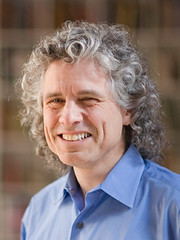 Steven Arthur Pinker [b. 1954] is an experimental psychologist and cognitive scientist best known for his advocacy of evolutionary psychology and the computational theory of mind. He is also known for his controversial positions on issues like eugenics and euthanasia. He is a best-selling author of popular science books as well as a popular speaker. He describes the human mind as a sort of Swiss Army knife that comes with specialized tools designed to deal with problems our Pleistocene ancestors encountered.
Steven Arthur Pinker [b. 1954] is an experimental psychologist and cognitive scientist best known for his advocacy of evolutionary psychology and the computational theory of mind. He is also known for his controversial positions on issues like eugenics and euthanasia. He is a best-selling author of popular science books as well as a popular speaker. He describes the human mind as a sort of Swiss Army knife that comes with specialized tools designed to deal with problems our Pleistocene ancestors encountered.
Pinker's works on how children acquire language echoes Noam Chomsky's work on language as an innate faculty of mind. Pinker argues that many other human mental faculties are adaptive in an evolutionary sense and can be understood best from that angle. Born into the Jewish community in Montreal, he became an atheist at the age of 13 but remains a "cultural Jew."
45. PZ Myers
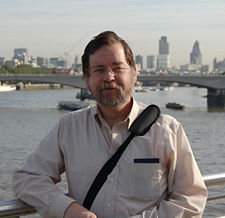 Paul Zachary Myers [b. 1957], better known as "PZ," is an evolutionary developmental biologist and professor of biology at the University of Minnesota, Morris. He is an energetic promoter of science generally and evolution in particular. He got involved in the use of the internet for this purpose and was a founding member of the pro-evolution website The Panda's Thumb, and created his own web blog, Pharyngula, in 2002. PZ Myers has become the leader of the science-focused online atheist movement and his brilliance as an atheist might be said to be the remarkable success he has had in this position.
Paul Zachary Myers [b. 1957], better known as "PZ," is an evolutionary developmental biologist and professor of biology at the University of Minnesota, Morris. He is an energetic promoter of science generally and evolution in particular. He got involved in the use of the internet for this purpose and was a founding member of the pro-evolution website The Panda's Thumb, and created his own web blog, Pharyngula, in 2002. PZ Myers has become the leader of the science-focused online atheist movement and his brilliance as an atheist might be said to be the remarkable success he has had in this position.
Pharyngula received the Koufax Award in 2005 for 'Best Expert Blog', and Nature named it the top ranking blog written by a scientist. It was picked up by Seed Magazine that year and anchors their large stable of popular, multidisciplinary science blogs. His increasing popularity as a proponent of atheism have made him a popular speaker at freethought, atheist and humanist events.
46. Jodie Foster
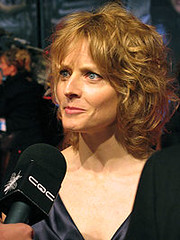 Alicia Christian Foster [b. 1962] is an American film actor, director and producer who has won three Bafta Awards, two Golden Globes, a Screen Actors Guild Award, a People's Choice Award, and two Emmy nominations for her extensive body of work. She began her career as a child star who later made the transition to adult stardom and expanded from there to produce some of the most popular and thought-provoking films of the last decades.
Alicia Christian Foster [b. 1962] is an American film actor, director and producer who has won three Bafta Awards, two Golden Globes, a Screen Actors Guild Award, a People's Choice Award, and two Emmy nominations for her extensive body of work. She began her career as a child star who later made the transition to adult stardom and expanded from there to produce some of the most popular and thought-provoking films of the last decades.
In 1997 she starred in the movie adaptation of Contact, a novel by Carl Sagan. The following year an asteroid was named in her honor. At the age of 14 she starred in the movie Taxi Driver, for which she was nominated for an Academy Award. This earned her the obsessed attention of would-be Presidential assassin John Hinckley Jr. who stalked her while she was attending Yale. Foster is an atheist who celebrates both Christmas and Hannukah with her two sons, and claims great respect for all religions.
47. Russell T Davies
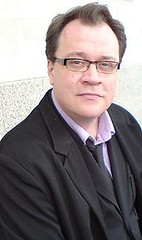 Stephen Russell Davies [b. 1963] is a Welsh writer and producer of the modern version of the popular science fiction television series Doctor Who. A fan of the good doctor since childhood, his writing and direction of the new series has won critical acclaim and a new generation of fans. In 2005, Davies was tapped to write and produce a more adult spinoff called Torchwood, which featured darker science fiction drama and more sex and which Davies described as "The X-Files meets This Life."
Stephen Russell Davies [b. 1963] is a Welsh writer and producer of the modern version of the popular science fiction television series Doctor Who. A fan of the good doctor since childhood, his writing and direction of the new series has won critical acclaim and a new generation of fans. In 2005, Davies was tapped to write and produce a more adult spinoff called Torchwood, which featured darker science fiction drama and more sex and which Davies described as "The X-Files meets This Life."
Davies was named the most influential gay person in Britain in 2006, spent several years on the top 100 list of influential media figures, and was named an Officer of the Order of the British Empire in 2008. His 2008 book Doctor Who: The Writer's Tale is a collection of autobiographical emails between Davies and journalist Benjamin Cook that has been described as "...a funny, revealing insight into the workings of the genius" behind the beloved Doctor Who.
48. David Chalmers
 David John Chalmers [b. 1966] Is an Australian philosopher, director of the Center for Consciousness and past director of the Center for Consciousness Studies at the University of Arizona in the U.S. His 1996 book The Conscious Mind is considered a seminal work on consciousness and its relation to issues in the philosophy of mind, even by its physicalist detractors. Chalmers argues for an essentially dualistic view of mind which he terms, "naturalistic dualism."
David John Chalmers [b. 1966] Is an Australian philosopher, director of the Center for Consciousness and past director of the Center for Consciousness Studies at the University of Arizona in the U.S. His 1996 book The Conscious Mind is considered a seminal work on consciousness and its relation to issues in the philosophy of mind, even by its physicalist detractors. Chalmers argues for an essentially dualistic view of mind which he terms, "naturalistic dualism."
Chalmers sits on the editorial board of the Journal of Consciousness Studies and his paper published there characterizing the mind-body problem in terms of philosophical zombies generated more than twenty response papers from such notables as Daniel Dennett, Francisco Varela, Francis Crick and Roger Penrose, and the exchanges are still among the most valuable literature debating the philosophy of consciousness ever generated.
49. Sean Carroll
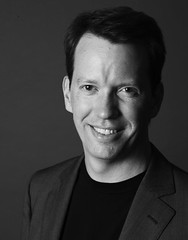 Sean M. Carroll [b. 1966] is a theoretical cosmologist specializing in general relativity and dark energy. Currently he is a Senior Research Associate in Physics at Caltech, writes scientific books and textbooks in his areas of expertise, contributes to the blog Cosmic Variance, writes articles for science magazines such as Nature, Seedm and and is a popular presenter and lecturer at scientific symposia.
Sean M. Carroll [b. 1966] is a theoretical cosmologist specializing in general relativity and dark energy. Currently he is a Senior Research Associate in Physics at Caltech, writes scientific books and textbooks in his areas of expertise, contributes to the blog Cosmic Variance, writes articles for science magazines such as Nature, Seedm and and is a popular presenter and lecturer at scientific symposia.
Carroll is perhaps better known for his strong advocacy of atheism, once going so far as to turn down an invitation to speak at a conference sponsored by the John Templeton Foundation because he didn't want to be seen as advocating a reconciliation between science and religion. He argues that scientific thinking must lead to a materialistic world view and a rejection of all notions of deity or spiritual nature. Which is why, Carroll wrote in 2003, (Almost All) Cosmologists are Atheists.
50. Mark Zuckerberg
 Mark Elliot Zuckerberg [b. 1984] is an American computer programmer named by Time Magazine as one of the World's Most Influential People in 2008 for his development of the internet application Facebook. While attending Phillips Exeter Academy he developed an AI program called Synapse that both Microsoft and AOL attempted to purchase as part of recruitment efforts, but he determined to attend Harvard instead.
Mark Elliot Zuckerberg [b. 1984] is an American computer programmer named by Time Magazine as one of the World's Most Influential People in 2008 for his development of the internet application Facebook. While attending Phillips Exeter Academy he developed an AI program called Synapse that both Microsoft and AOL attempted to purchase as part of recruitment efforts, but he determined to attend Harvard instead.
Zuckerberg launched Facebook from his Harvard dorm room in 2004. It spread to other universities with the help of his roommate Dustin Moskovitz. Despite some controversy over the platform and a lawsuit over the ConnectU application which was later dismissed, Zuckerman sold a 1.6% stake in Facebook to Microsoft, which had a $15 billion market value at the time according to Forbes. He was born into the Jewish tradition, yet self-identifies as an atheist.





